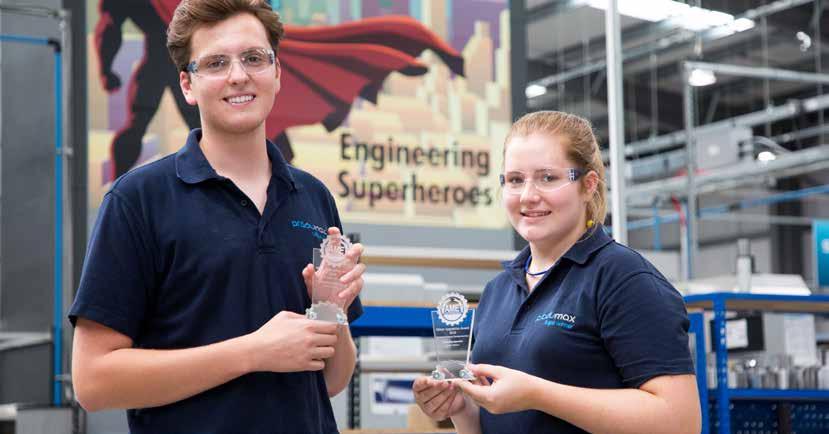
8 minute read
IFM STUDENTS HELP TO TURN 100-YEAR-OLD BAKERY INTO THRIVING ONLINE BUSINESS
Elizabeth Tofaris ejar2@cam.ac.uk
Founded in October 1920 by brothers Ernest and Arthur Mason, who wanted to put their demob money to good use, it is fair to say that Fitzbillies is something of a Cambridge institution.
Advertisement
Despite countless ups and downs throughout its 100-year history, which has seen the bakery face war, bankruptcy and a fire (not to mention competition from larger high-street bakery chains), Fitzbillies has endured. Its delicacies – most famously its everso-sticky Chelsea buns – continue to satisfy students, locals and tourists alike.
Current owners Alison Wright and Tim Hayward (who relaunched the bakery in 2011 after it closed as a result of bankruptcy) now manage the business, which consists of a café behind the cake shop in Trumpington St, a second branch in Bridge St and a larger off-site bakery, which makes artisan bread and cakes.
However, like many other small independent businesses, the COVID-19 pandemic threw the bakery an unexpected curveball, abruptly forcing the shop and cafés to close and leaving the team with no choice but to reconsider the way they did business:
“For the first few weeks of lockdown, we didn’t know if we’d even have Chelsea buns to sell,” explains Fitzbillies CEO Alison Wright. “Just before lockdown we had decided to improve our website, and people had been able to place orders, but because the business was always super busy on the shop floor, we’d never put much effort into it. We never promoted it, and the customer journey was probably rather terrible.”
Armed with a newly improved website and some unexpected thinking time, Alison and the team set about acquiring a warehouse space next door to their current bakery, with the plan being to use it as a packing space if they could make more of their online offerings.
With a renewed focus and desire to see online offerings grow, Alison was delighted when IfM Industrial Tutor Vanessa McNiven contacted her to ask if she would consider having a group of Industrial Systems, Manufacture and Management (ISMM) students come to Fitzbillies for their industrial placement:
“Just as I was thinking about how I was going to put enough strategic thinking time into the online business to justify paying for the new warehouse, IfM got in touch and asked, ‘Would you like to take some ISMM students?’ I replied instantly – ‘Yes! Please can they come and do a project on how to grow an online business?!’”
Solving problems beyond the factory floor
Every year, 40 students from across the globe complete the MPhil in Industrial Systems, Manufacture and Management (ISMM) at IfM, which is a 1-year postgraduate programme designed to help prepare students for careers in industry. The course provides students with real-world experience and the theoretical knowledge needed to help solve problems that exist far beyond the factory floor.
Two groups of students from the 2021–22 cohort were placed at Fitzbillies – an unlikely choice, perhaps, for an industrial placement, given the bakery’s size and lack of “traditional” manufacturing processes.
However, as Industrial Tutor Vanessa McNiven explains, ISMM focuses on the entire value chain of manufacturing, not just production; and smaller-sized businesses like Fitzbillies can provide just as much value to students as would larger factory-based settings:
“In-company projects solving real business or technical problems are what makes ISMM unique, and we try and give students as wide a range of opportunities as possible by working with lots of different-sized companies. Manufacturing isn’t just about making stuff, it’s about everything that goes around it, and marketing and sales are part of that.”
Against a backdrop of sharp rises in the costs of labour, ingredients and fuel, CEO Alison was keen for the ISMM teams to tackle both online growth and potential shop-floor inefficiencies, which she believed would be central to the bakery’s post-COVID recovery and growth:
“What was most on my mind was the profitability of the bakery. Bakeries have always historically done fairly amateurish pricing based on ingredient cost, but because we bake everything by hand, we spend twice as much on bakers as ingredients. So, not only did I want to know about how to grow the business online, but I also needed to know how to do proper pricing and how to get more efficient.”
Sales up by 30%
The first group of ISMM students (Alistair Chan, Wassim Ezzaddine, Sangamithra Selvaraj and Hassan Yusuf) were tasked with helping Fitzbillies to explore the value of their online potential, something that Alison knew was needed but simply hadn’t had the luxury to devote proper headspace to.
Hassan Yusuf, who worked as an operational engineer in the energy industry for 2 years before coming to IfM, explains how the students encouraged the bakery to have a complete rethink about the way their website was structured:
“We did a survey, and the majority of customers (67%) weren’t aware Fitzbillies even had an online store, so our first task was increasing awareness of this. We also encouraged the bakery to flip their website, so the focus was on their online product offerings, rather than the parts of the business that were already well established. We also suggested that they make much more use of the shopping features of their social media accounts; and we identified Cambridge alumni as a key new audience for them to market to.”
Alison has described the student’s suggestions as having a “transformational” effect on the business:
“The students pointed out to us that our website positioned us as mainly two cafés in Cambridge, with an online shop function attached, so it was all pretty much oriented to the café (opening times, menus, etc.). Flipping it around has been transformational. It was a real light-bulb moment for us.
“They also encouraged us to have a wider range of products at a wider range of price points. For example, before, we veered away from sending fresh products by post, but now it’s simply part of the offering.”
Alison explains how, thanks to these changes, as well as a social media revamp and an advert taken out in the alumni magazine, Cam, online product sales grew by 30%:
“As a small business, you have lots of ideas but very little ability to make a strategic plan, prioritise and stick to it,” she says. “What the students did was to help us focus on taking specific actions, and, because of their help, I believe we are good for the next step of growth.
“We have achieved much more than we ever would have done under our own steam. It has given us a new focus and a new lease of life when we really needed it.”
Beyond the impact on the bakery, Industrial Tutor Vanessa explains how having a meaningful effect on a business also provides a sense of achievement for the students:
“From our perspective, we really want the businesses to get something out of it,” she says, “…but we also want the students to have the experience of starting with a problem from scratch and then being able to provide something of value back. And that’s exactly what they did. By the end of the project, I think they got a real sense of achievement for having come up with something that was so well received by the company, who were able to make changes based on the results of the project.”
Hassan is in no doubt that Alison and her team’s openness throughout the project also played a key role in its success:

“Alison and her team were always very open to our ideas. They were very generous with their time and energy and were willing to put their trust in us – this allowed the project to be as successful as it was. Personally,” he goes on, “the project has given me a lot of confidence, particularly in terms of me focusing on my career path. I am going to draw on this experience for many years to come.”
Part of the team
A few months later, in March 2022, students Ben Purkis and Mark Taylor were tasked with improving suspected day-to-day inefficiencies. The students began by basing themselves in the bakery for a full night shift at 1 am, watching and timing each baker’s task. And over the next 2 weeks, they spent time in the bakery and the cafés, sourcing as much information as possible about the operational setup, as well as doing lots of numbercrunching.
By using a string model to measure exactly how far someone had to walk to make an item, they then created a Lego model of how the bakery could potentially be reorganised to optimise performance. A new product-pricing model identified products that could be wound out of production (which helped to increase manufacturing efficiency, as well as profitability), and by developing an econometric forecasting model to help the bakery cope with busier periods they helped the business to cut waste.

“The amount of work they did in 2 weeks was just incredible,” says Alison. “They helped us to make some quite bold decisions, because we understood just how long some products were taking to make. We have reorganised the bakery, implemented a newly reviewed pricing model and are using the extremely accurate forecasting model, which is now almost accurate to 0.01%.”
“The team, especially the bakers on the shop floor, were open to ideas and very forward thinking,” explains student Ben, who says relationship-building was key.
“We spent the first few days building relationships with the bakers – we got in early to bake bread with them, and we went on delivery runs with them so we could really understand the business and the key areas where they needed to improve.
“Alison had already successfully implemented a movement of change/ continuous improvement culture within the team, so everyone was already on board with us being there and open to our ideas.”
Ben also explained how communicating and engaging the team in the process was central to its success:
“After designing a brand-new layout, we made a Lego model of it and took it down to the production floor and said ‘play with it, make changes’, so they could really have a feel. We showed them each step of the changes. You can have the best idea in the world, but you need a team who are happy to receive it.”
John McManus, IfM Industrial Tutor, says that the students felt like part of the team:
“Even now, after the project has finished, Alison still communicates with the students, and they are still making some tweaks to the forecast. They clearly made an impression and genuinely felt like they were part of the team,” says John. “They were able to help the company look at things they knew they had to do but could never find the time to do because they were so busy with today’s priorities – a common problem for so many small businesses.
“Our experience of project placements is that sometimes students come away feeling they’re not really sure what they’ve done to help. The great thing about a company like Fitzbillies is the ownership. It was a wonderfully welcoming environment for the students, and they are able to see that their help has made a difference,” says John.
Good for the next stage of growth
Thanks to the help and insights of both sets of students, Alison feels confident that the future is bright for the bakery:

“The students have helped us to transform our online business. They gave us the direction that we needed and the confidence to make bold decisions. Ultimately, we are committed to making sure that Fitzbillies is fit for the next 100 years, and getting this kind of cutting-edge help has made sure that we’re good for the next stage of growth.”










